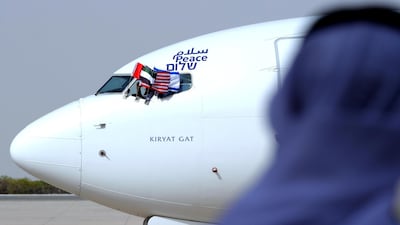The UAE and Israel are moving closer to finalising a taxation treaty that will make the two nations more attractive to international investors, according to an Israeli official.
The double taxation treaty would make the two countries more competitive and boost economic activity, Shira Greenberg-Gelbwaser, chief economist and director of state revenue, research and international affairs at Israel’s Ministry of Finance said on Wednesday.
“We are just in the final stage of negotiation [and] I believe we will finish the tax treaty with the UAE within the next weeks,” Ms Greenberg-Gelbwaser told an online panel discussion arranged by Bloomberg. “Within two months [or] three months … [the] private sector would be able to see all the details.”
A free trade agreement and double taxation treaty are among several frameworks being worked on by the UAE and Israel to increase trade and investments flows between the two nations after they normalised relations last year.
The government is acting as an enabler, building frameworks for the private market to make investments between the countries more attractive to foreign investors and “we are in … very intensive negotiation about the treaty”, she said.
“I can assure the private sector that this tax treaty between the two countries will be very, very useful.”
In the short term, Israel expects its trade with the UAE to reach $2.5bn in the wake of the Abraham Accords, but in the longer term, bilateral trade could grow to $6bn, Ms Greenberg-Gelbwaser said.
“These are very huge numbers,” she said, adding that its bilateral trade with Bahrain, which is also a signatory of the accords, could reach $220 million.
Last month, the UAE, the Arab world’s second-largest economy, announced the establishment of a $10bn fund with Israel that will invest in sectors including energy, manufacturing, water, space, health care and agri-tech. The fund will support development initiatives to promote regional economic co-operation between the two countries.
Several other investment deals have been signed at the corporate level with banks exploring potential partnerships and airlines starting commercial operations to further facilitate trade and tourism. Reciprocal agreements have also taken place between stock markets and diamond centres in both countries.
Mariam Al Mheiri, UAE Minister of State for Food Security said investments into sectors such as agricultural technology is high up on the UAE’s agenda, but that the flow of investments will be “definitely bilateral”.
Both Israel and the UAE have similar environments. While Israel has developed its innovation and technology sectors, the UAE has the advantage of being the global logistics hub.
“We have reach to [a] market of consumers of over 2 billion people,” she said.
The Emirates, which is planning for the next 50 years of growth and development, “wants to bring the world to the UAE” and is looking at enablers to develop an ecosystem that attracts investments.
These include the Abu Dhabi Investment Office, Mohammed Bin Rashid Innovation Fund and Emirates Development Bank, which this week announced Dh30bn of financing across sectors. Hub 71 and Sharjah Innovation and Technology Park are examples of enablers for smaller businesses and start-up, she said.
“We [Israel and the UAE] both have advantages that each side can benefit from,” she said.


